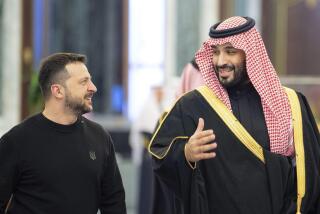Arab Summit Plan Rejected by Mubarak : Diplomacy: Nothing to talk about, Egyptian leader says of the Soviet initiative on Iraq.
- Share via
CAIRO — Egyptian President Hosni Mubarak on Wednesday rebuffed Soviet proposals for a meeting of Arab leaders to resolve the Persian Gulf crisis and warned that the situation in the gulf “could explode at any time.”
As three key Arab foreign ministers met in Saudi Arabia to discuss the crisis, the Egyptian president downplayed Soviet President Mikhail S. Gorbachev’s suggestion this week that Iraq might be agreeable to an “inter-Arab meeting” to settle the issue, saying there are still no specific peace proposals to discuss.
Gorbachev called for Arab nations to embark on a new initiative to resolve the crisis peacefully, suggesting that the Iraqis “could be ready” for such a settlement. “If we were to have an inter-Arab meeting, this would be the quickest way to a settlement,” Gorbachev said.
But in the first official Arab reaction to the proposal, Mubarak noted that Arab leaders had convened in August but were unable to resolve the crisis.
“The Arab countries have tried a lot, and we’re still trying. If these proposals call for a peaceful solution, then it should be borne in mind that there isn’t a big or small country, Arab or Western, which doesn’t want a peaceful solution,” he told reporters.
“We would like to ask if the Soviet envoy managed to reach something definite, so we can hold an Arab summit to discuss something specific. We have not been told of it. If we are going to call an Arab summit while there is no clear vision, it will be a summit of insults. We reject summits of insults.”
Egypt’s semiofficial Al Ahram newspaper, in a front-page editorial, echoed Mubarak’s sentiments and said any discussions of another Arab League meeting would simply help Iraq stall for time.
Gorbachev’s call for an Arab solution was an attempt to disguise Soviet envoy Yevgeny Primakov’s failure to come up with a resolution to the crisis during his recent Middle East tour, wrote Al Ahram’s editor in chief, Ibrahim Nafeh, a confidant of Mubarak.
“The Soviet Union attempts to cover the failure . . . to absolve itself of responsibility for a solution, and it casts all the blame on new parties which have no key to the solution,” Nafeh wrote. “It is only an attempt to prolong the crisis and clear the way for the only remaining solution, the military option, which is a devastating option that will only bring catastrophe to the Arabs.”
Mubarak warned of the consequences of failing to achieve a peaceful resolution to the crisis.
“We hope that our brothers in Iraq will understand completely the situation is very dangerous and could explode at any time,” he asserted. “Iraq should not take lightly such a force in the gulf, because Iraq will suffer great damage. We too will suffer.”
Mubarak went on to say that Arab leaders realize that “Iraq is in a difficult position, but we are willing to help it after it accepts withdrawal and the return of legitimacy.”
The hint of conciliation echoed remarks last week by Saudi Arabia’s defense minister, Prince Sultan ibn Abdulaziz, suggesting that Arab leaders might be willing to consider Iraq’s territorial claims against Kuwait in the aftermath of an unconditional pullout of Iraqi troops.
There have been unconfirmed reports that Iraqi President Saddam Hussein might be willing to withdraw his troops northward to a point that would allow him to keep key islands with access to the gulf and to acquire a disputed oil field along the Iraq-Kuwait border. Arab leaders in recent days have continued to insist on a full and unconditional withdrawal but are also suggesting that Iraq might find support for its territorial claims later.
“We hope that Iraq . . . helps along the withdrawal,” Mubarak said, “and negotiations can be started to look into Iraq’s claims.”
Mubarak’s comments came as Egypt’s foreign minister, Esmat Abdel Meguid, flew to Jidda, Saudi Arabia, to meet with his Syrian and Saudi counterparts to discuss the crisis in the gulf. The three countries are the key power brokers in the Arab alliance formed to combat the Iraqi invasion, and both Syria and Egypt have dispatched troops to Saudi Arabia to join the U.S. and multinational forces.
U.S. Secretary of State James A. Baker III is scheduled to fly to Saudi Arabia on Sunday to begin a tour of the Middle East that will also include stops in Bahrain, Egypt and Turkey.
More to Read
Sign up for Essential California
The most important California stories and recommendations in your inbox every morning.
You may occasionally receive promotional content from the Los Angeles Times.













